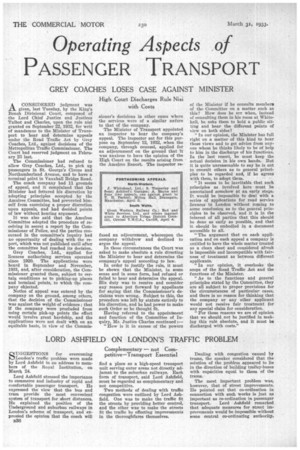Operating Aspects of PASSENGER TRANSPORT
Page 50

If you've noticed an error in this article please click here to report it so we can fix it.
GREY COACHES LOSES CASE AGAINST MINISTER
High Court Discharges Rule Nisi with Costs AA CONSIDERED judgment was given, last Tuesday, by the King's Bench Divisional Court, composed of the Lord Chief Justice and Justices Talbot and Charles, upon the rule nisi granted on September 22, 1922, for writ of mandamus to the Minister of Transport to hear and determine appeals under the Road Traffic Act by Grey Coaches, Ltd., against decisions of the Metropolitan Traffic Commissioner. The Court had reserved judgment on February 23 last.
The Commissioner had refused to allow Grey Coaches, Ltd., to pick up passengers in St. George's Circus and Northumberland Avenue, and to have a terminal point in Vauxhall Bridge Road.
The coach company had 11 grounds of appeal, and it complained that the Minister had fettered his discretion by adopting principles accepted by the AmnIree,Committee, had prevented himself from exercising a proper discretion upon appeals, and had decided points of law without hearing argument.
It was also said that the AmuIree Committee adopted the procedure of receiving in secret a report by the Commissioner of Police, and the parties concerned in the committee's inquiry had no opportunity of dealing with the report, which was not published until after the committee had reached its decision.
Grey Coaches, Ltd., applied for licences authorizing services operated sinen 1920. The applications were heard in September and November, 1931, and, after consideration, the Commissioner granted them, subject to certain conditions as to picking-up places and terminal points, to which the company objected.
Notice of appeal was entered by the company on the ground, among others, that the decision of the Commissioner was against the weight-of evidence; that if the company were precluded from nsing certain pick-up points the effect -would involve great hardship, and the applications were not dealt with on an equitable basis, in view of the Commis
sioner's decisions in other cases where the services were of a similar nature to that of the company.
The Minister of Transport appointed an inspector to hear the company's appeal. The inspector sat for this purpose on September 12, 1932, when the company, through counsel, applied for an adjournment on the ground that It was anxious to have the opinion of the High Court on the results arising from the Amulree Report. The inspector re fused an adjournment, whereupon the company withdrew and declined to argue the appeal.
In those circumstances the Court was asked to make absolute a rule directing the Minister to hear and determine the company's appeal according to law.
In order to justify the rule, it must be shown that the Minister, in some sense and in some form, had refused or failed to hear and determine the appeal, His duty was to receive and consider any reason put forward by appellants for saying that the Commissioner's decisions were wrong. Subject to this, the procedure was left by statute entirely to his discretion, and he had power to make such Order as he thought fit.
Having referred to the appointment and function of the Committee of Inquiry, Mr. Justice Charles continued :— " How is it in excess of the powers of the Minister if he consults members of the Committee on a matter such as this? How does he err when, instead of consulting them in his room at Whitehall, he asks them to hold a public sitting and hear the different points of view on both sides'?
In our opinion, the Minister has full right on a matter of this kind to hear those views and to get advice from anyone whom he thinks likely to be of help to him in the discharge of his functions. In the last resort, he must keep the actual decision in his own hands. But it is quite unreasonable to say he is not to consult others as to general principles to be regarded and, if he agrees with them, to adopt them.
"lit seems to be inevitable that such principles as involved here must be ascertained somehow at an early stage. It would be impossible to deal with a series of applications for road service licences in London without coming to some conclusion as to the general principles to be observed, and it is in the interest of all parties that this should be done as early as possible, and that it should be embodied in a document accessible to all.
"The argument that on each application and on each appeal a company is entitled to have the whole matter treated as a clean sheet and considered afresh is impossible and incompatible with fairness of treatment as between different applicants.
"In our opinion, it overlooks the scope of the Road Traffic Act and the functions of the Minister.
"As to the functions and general principles stated by the Committee, they are all subject to proper provisions for the circumstances of particular cases, and there is no reason for thinking that the company or any other applicant would not receive fair treatment for any special claim for consideration.
"For those reasons we are of opinion that we ehould not be justified in making this rule absolute, and it must be discharged with costs."




























































































